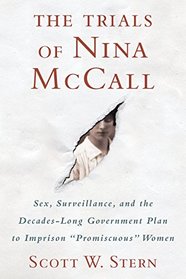Search -
The Trials of Nina McCall: Sex, Surveillance, and the Decades-Long Government Plan to Imprison "Promiscuous" Women
The Trials of Nina McCall Sex Surveillance and the DecadesLong Government Plan to Imprison Promiscuous Women
Author:
The nearly forgotten story of the American Plan, a government program to regulate women's bodies and sexuality--and how they fought back--told through the lens of one of its survivors — "A consistently surprising page-turner...a brilliant study of the way social anxieties have historically congealed in state control over women's bodies and behavi... more »
Author:
The nearly forgotten story of the American Plan, a government program to regulate women's bodies and sexuality--and how they fought back--told through the lens of one of its survivors — "A consistently surprising page-turner...a brilliant study of the way social anxieties have historically congealed in state control over women's bodies and behavi... more »
ISBN-13: 9780807042755
ISBN-10: 0807042757
Publication Date: 5/15/2018
Pages: 368
Rating: ?
ISBN-10: 0807042757
Publication Date: 5/15/2018
Pages: 368
Rating: ?
0 stars, based on 0 rating
Publisher: Beacon Press
Book Type: Hardcover
Other Versions: Paperback, Audio CD
Members Wishing: 3
Reviews: Amazon | Write a Review
Book Type: Hardcover
Other Versions: Paperback, Audio CD
Members Wishing: 3
Reviews: Amazon | Write a Review
Genres:
- Biographies & Memoirs >> Historical >> United States
- Biographies & Memoirs >> Specific Groups >> Women
- History >> Americas >> Native American
- History >> Americas >> United States >> Civil War
- History >> World >> Women in History
- Health, Fitness & Dieting >> Psychology & Counseling >> Sexuality
- Medical Books >> Psychology
- Nonfiction >> Women's Studies




